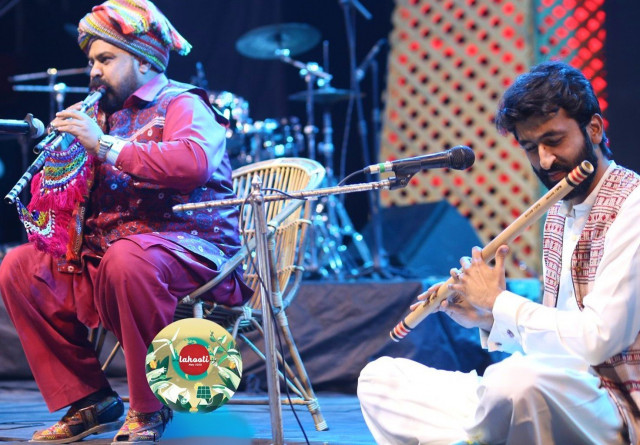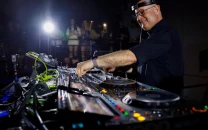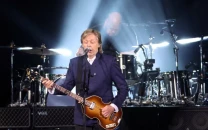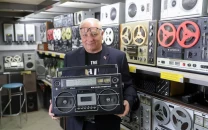Meet Daniyal Ahmed, the bansuri nawaz challenging norms of the music world
Apart from being an anthropologist, curator, and producer Ahmed is also the co-founder of Karachi Community Radio.

The relics of music inherited by a region speak volumes about its inhabitants’ religion, language, and social status. But aside from being inherited or adopted, music is fundamental to the relationship of an individual with their surroundings. It is not something human beings can take ownership of and it occurs naturally, according to Danyal Ahmed.
Musician, anthropologist, curator, producer and co-founder of Karachi Community Radio, Ahmed does not come from a family of ‘ustads’, but after studying migrant life in Germany through the lens of sound, he became invested in “sonic practices, history of music, sound reproduction, and musical exchange through migration.”
Lost in honour
“Many will listen to music here involuntarily but if a child wants to become a musician, he/she or they will be told it isn’t an ‘honourable’ profession,” Ahmed tells The Express Tribune. “Parents in Pakistan might also tell their children it is not a lucrative career, and rightfully so, but simply observing how the word ‘Mirasi’ has been distorted, tells you where the honour of a musician lies.”
Reinstating how ‘Mirasi’, driven from the Arabic term ‘Mīrās’ (inheritance), should make traditional classical singers and musicians the inheritors of something glorious, Ahmed adds, “but since that’s not deemed to be the case here, there’s nothing special to recall about the discouragement that came from my parents when I was growing up,” admits the flute player.
Many will listen to music here involuntarily but if a child wants to become a musician, he/she or they will be told it isn’t an ‘honourable’ profession. Parents in Pakistan might also tell their children it is not a lucrative career, and rightfully so, but simply observing how the word ‘Mirasi’ has been distorted, tells you where the honour of a musician lies.
In his recent Instagram post, Ahmed shared a photo of himself performing in a Ramazan transmission with the caption, “Growing up with much conflict and confusion about music and Islam, it was a real pleasure and privilege to play my bansuri on a Ramzan transmission on national television last evening. Empty stomach, parched mouth, but one step closer to making music a natural part of our everyday lives.”
A staunch follower of “the more you learn the more conscious you become of how little you know,” Ahmed, who’s performed with the likes of alghoza player Akbar Khamiso Khan at Lahooti Melo ‘20, adds that no matter how much you avoid it, music also becomes a part of your religious recitations. “You are reminded of God through Qawwalis, religious sermons in Punjab have a melodic touch to them, even the Quranic Tilawat is so melodic, whether we agree with this notion or not.”
Alongside a flute rendition of Qasīdat al-Burda Sharif he shared online, Ahmed relays how utterly fascinating it is that the poetry and associated melody of an ode to the Prophet (PBUH), which was written in North Africa in the 13th century traveled 800 years and 8000 kilometers to become instantly recognisable to Muslims across Pakistan today.
Sharing a history of the emergence of the Qasīdat al-Burda Sharif, Ahmed laments how although we know about the poetry and the poet, very little is known about the melodic interpretation of it.
Kanhaiyya connection
“I’ve been learning the flute for a while now but it’s not my first instrument. I started off by convincing my family into getting me a guitar. I had a bansuri lying around, though, I never really picked it up,” confesses Ahmed, who can’t imagine putting it down now.
Reminiscing how the instrument “cast a spell” on him, Ahmed provided a lowdown of the many charms of it that lured him in. “It’s an ancient instrument that most closely emulates the human voice. It was in the 20th century, after Pandit Pannalal Ghosh pioneered the Indian classical Flute, that it became a part of Indian classical music. So in a way, it’s also a modern instrument. Another thing I find very interesting about the bansuri is the number of languages you can speak with it. You can play it in a Sindhi style, in a Punjabi style; you can play songs from any genera with it. It’s such a versatile instrument which also preserves its uniqueness,” assures the teacher and student.
Another video of Ahmed on his Instagram shows him jamming on the beach with murli nawaz Natha Khan. “Came to the beach for a swim but found myself trying to stay afloat on the vast ocean of Sindhi music instead. The wave-like movements and pulsating rhythms that Natha Khan plays on the murli are called lehras, from the word lehr (wave). The flavours of these rhythmic movements are characteristic elements of Sindhi and Rajasthani music,” he informs.
Ahmed also points out that while a flute does not require tuning, a bansuri nawaz must tune himself to play it. And of course, its portability adds to the many reasons Ahmed carries it everywhere.
The ‘classical’ conundrum
I don’t even like calling the music I play ‘classical'. We adopted the term from the West and because of it, what we play today is dubbed a thing of the past. Shastriya Sangeet is ideal for me because the latter is an amalgamation of sangat and geet.
But while the artist spends his days learning classical music and is seen performing at a wedding in Tando Jan Muhammad on his social media, he does not consider himself a performer of South Asian classical music, yet.
“I don’t even like calling the music I play ‘classical’,” he argues. “We adopted the term from the West and because of it, what we play today is dubbed a thing of the past,” adds the musician. The innovation observed in what is deemed as classical music of South Asia today proves that while a raag remains untouched, the evolution in arrangement and incorporation of various Western instruments can change the sound and the experience of listening to it.
So Ahmed would rather stick with the Hindi term Shastriya Sangeet. “Provided our postcolonial differences with India, I understand why many would refrain from adopting it. Some also end up calling it Khayal, because Khayal is what came after Dhrupad. However, Shastriya Sangeet is ideal for me because the latter is an amalgamation of sangat and geet. Even the term Guitar is driven from geet and tar but many will happily ignore that fact,” shares Ahmed.
The flute player, who started his own musical journey with a guitar, is now a student of renowned flute maestro and Pride of Performance recipient Ustad Salamat Hussain. He is also a lecturer at Habib University. While the growth of music programmes abroad have made learning music theory less cumbersome, the traditional system of private instruction continues to brew commendable talent in Pakistan to this day and Ahmed is an example of just that.
Have something to add to the story? Share it in the comments below.



















COMMENTS
Comments are moderated and generally will be posted if they are on-topic and not abusive.
For more information, please see our Comments FAQ